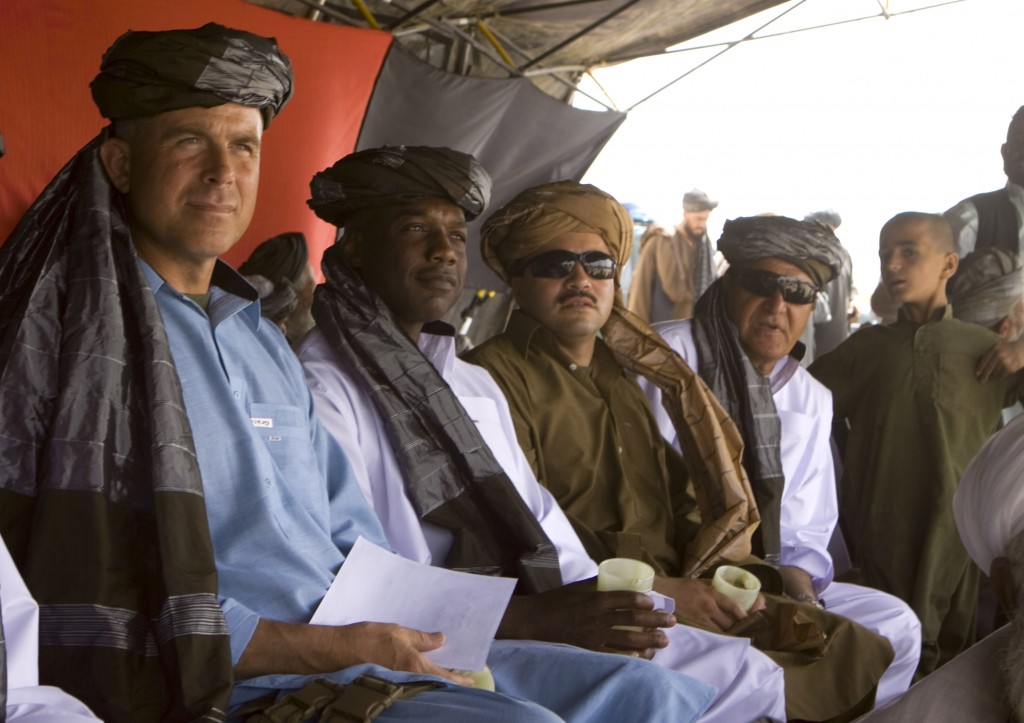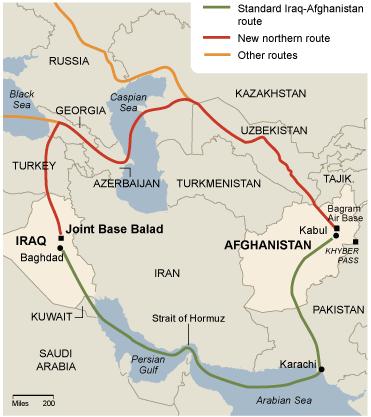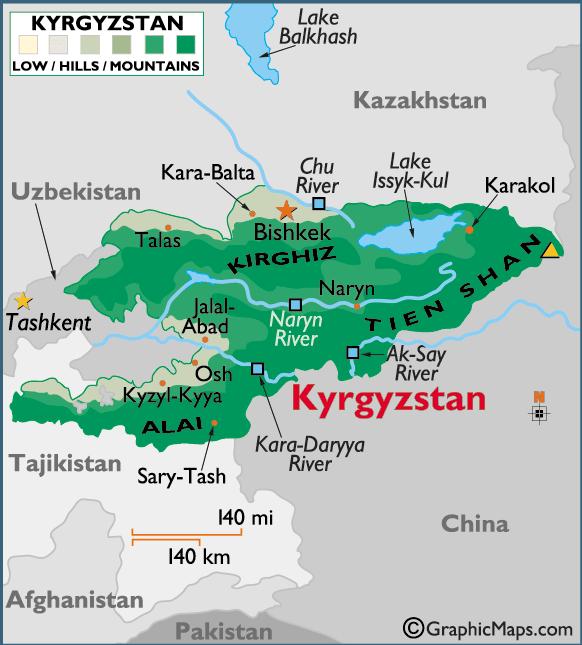My friend Michael Yon has had some difficulties of late. From his Facebook page, an embed has been halted. He has also expressed deep reservations about the senior leadership in Afghanistan, weighing in with some fairly hard hitting prose (pieced together from Facebook and NRO):
Today, I do not trust McChrystal anymore than some people trust the New York Times, Obama or Bush. If McChrystal could be trusted, I would go back to my better life. McChrystal is a great killer but this war is above his head. He must be watched … Crazy Monkeys: Senior Public Affairs people often make me think of crazy monkeys. (Like some monkeys I’ve seen in India.) They break into the cockpit and start flipping switches with no idea what the switches do. They keep doing it until something breaks or you beat them back. And just when you think you’ve beaten …them all back, another monkey slips in. (This time by name of Admiral Smith.)
The disembed from McChrytal’s top staff (meaning from McChrystal himself) is a very bad sign. Sends chills that McChrystal himself thinks we are losing the war. McChrystal has a history of covering up. This causes concern that McChrystal might be misleading SecDef and President. Are they getting the facts?
Next time military generals talk about poor press performance in Afghanistan, please remember that McChrystal and crew lacked the dexterity to handle a single, unarmed writer. 100,000 troops — probably that many contractors — and no room for one writer. How can McChrystal handle the Taliban?
To make matters worse, it seems that some prominent folks in the Milblogging community are taking Michael to task for what they consider bad form. Uncle Jimbo (Jim Hanson at Blackfive) is indignant.
Now he is telling us that Gen. McChrystal is over his head and needs to be watched? I’m sorry but if I have to choose between the eminently qualified and competent McChrystal and Yon, there’s not even a question … I can’t believe he is questioning McChrystal’s character. That’s BS and low. He has claimed he was told there was no room for him to embed, well that is not what I heard. It appears he was again removed for violating the embed rules. At some point you need to own up to the fact that it’s not the rest of the world…..it’s you. That point is now.
Disclaimer: I have not embedded…ever. I am not going to embed because I don’t want to. I like being in the rear w/ the gear. I have plenty of stamps on my passport, have toured the most craptastic places on the planet, and now don’t deploy anywhere w/o room service. I respect what Michael Yon has done, I just think he is acting like a jackass.
Jim links others in the Milblogging community who are discussing Michael’s most recent words. Milblogging.com holds that Michael owes us some facts, and Laughing Wolf at Blackfive also weighs in negatively. I have never been embedded either (although not for lack of trying). But I sent a son off to war, and I defy anyone to tell me that it’s any less difficult to deploy a son to combat than it is to deploy yourself. Jim Hanson has a right to weigh in – and so do I.
I have a history of Milblogging that is marked with potholes as well, and have taken on some staff and flag level officers. Two years ago I took on General Rodriguez for his fanciful claims about the Taliban being in such trouble that they couldn’t and wouldn’t mount a spring offensive in Afghanistan. I pointed out even before the Taliban offensive began that their singular focus at that time would be the interdiction of logistical lines, and recommended that we engage the Caucasus region for a Northern route into Afghanistan (we are only belatedly coming around to my counsel). I was right, of course, but you make no friends in the chain of command when you claim that your own analysis is better than that of Army intelligence (and a flag level officer), whether true or not.
Next, recall that I parodied the notion that an internal investigation into Marine deaths in the Kunar Province having to do with denial of artillery support because of rules of engagement would in any way ever hold the purveyor of that ROE – General McChrystal – responsible. Again, one wins no friends with such hard hitting prose. Better yet. General Rodriguez and General McChrystal are close friends. I’m sure that neither one appreciated my comments concerning the other.
I have very specific reasons to believe that my hard hitting style, my critical nature, and my cataloging of the various blunders in both Iraq and Afghanistan have cost me readership and standing within the Milblogging community. Beyond that, there are the cold relations with high level officers. Jim Hanson almost immediately received a response from General McChrystal in response to his letter concerning rules of engagement. I had to send his public affairs officer a letter three different times to get a response to a OPCON question from – you guessed it – the PAO rather than McChrystal.
All of this points to the question of what obligations we have as Milbloggers (beyond operational security and other basic issues). I can’t speak for all Milbloggers, but I can speak for myself. I am not trying to turn a discussion about Michael Yon into one about myself, but I am trying to relate. I have a moral obligation to support the warriors we deploy to do our violence for us (and that includes our warriors in the chain of command). I have an obligation to tell the truth, and I have done that as best as I know. I have an obligation to fulfill my commitments: I have told Michael Yon that I would pray for his safety, and I have done that.
I am under absolutely no obligation whatsoever to support any particular personality, any strategy, any tactic, technique or procedure, any set of rules, or any doctrine. I will do the best I can to hold those in the military and also those who fund them accountable. This is oftentimes unpleasant, but I will issue no complaints. I have chosen my path.
Similarly for those who know Michael, he spoke against those who said that Operation Iraqi Freedom was lost, or that it was won; he said that Afghanistan would be problematic even before I did (he saw it first hand); he talked about the job that the British were doing in Basra even when I was lamenting the poor strategy; he has also reported on problems with allies in Afghanistan. In short, Michael Yon has been an honest broker of information and analysis, whether pleasant or not, whether his analysis agreed with my own or not. Perhaps I feel a kinship with him even though I have never met him.
Either way, Jim Hanson sets two people in juxtaposition – General McChrystal and Michael Yon, and says that he’ll take McChrystal. I’m not at all troubled by the dilemma. I refuse to play. But I am particularly troubled by the notion, even if faintly present, that I am somehow obligated to march in lock step with the senior officers. If I am not obligated to march to their beat, then neither is Michael Yon. He can give account for himself and his own words. He will take his lumps at times, and if he broke some rule or other (as Hanson charges), then he will suffer whatever consequences there are for that infraction. But as a journalist there is no reason to expect that he will be any less critical of things than say the New York Times, albeit for different reasons.
Jim Hanson tells us that he believes differently concerning Michael’s recent embed experience (“ … that is not what I heard”). This is all well and good. He can believe what he wants. I generally have a high bar for information I use or purvey on the blog. I wasn’t there, I don’t know anyone who was, and even if I did know someone who was there, I also know that the story can become muddled in translation. What happened to Michael is his business, not mine. As for whether McChrystal “needs to be watched,” I’ll pass on that and let Michael explain his prose. I have expressed very detailed disagreement with General McChrystal’s ROE and what I see as his micromanagement of the campaign. I don’t retract or apologize for a single word of my prose.
Michael will continue in my estimation to be the Ernie Pyle of our generation and this incident will pass. It’s also my estimation that these open letters to Michael are a lot of sound and fury signifying nothing. We Milbloggers have better ways to spend our time than cannibalize our own. The most important thing to come out of the affair is another chance to say what we all know but tend to forget when it comes to the nation and military that we love. I am under no obligation to shill for the chain of command. Neither is Michael – and neither are you.






